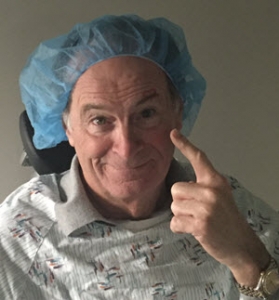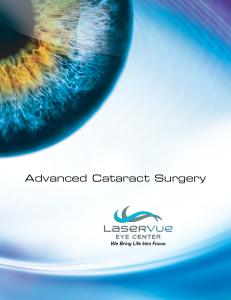Why You Should Stop Advertising “Surgery!”
Why You Should Stop Advertising “Surgery!”

It is very common to see ads with headlines such as, “Now Offering Bladeless Laser Cataract Surgery” or “ALL LASER LASIK IS MAKING LASIK SAFER”. These types of ads may differentiate you from your competitors, but they do little to make the public feel more at ease about having surgery.
Continuous advancements in cataract and laser vision correction technology have forced many practices to spend their advertising dollars educating patients about how their technology improves surgical outcomes. But patients already expect you to have the latest technology so there is no motivation for them to respond to technology oriented ads.
Instead, patients who are considering LASIK are more interested in finding out if they are a good candidate for LASIK and what their vision might be like if they decide to have it. And patients who are experiencing diminishing vision due to lenticular changes simply want to know why their vision keeps getting worse.
So what type of advertising DOES work?
Advertising that communicates AFFORDABILITY and offers information that will help patients better understand their vision issues, such as, “Advanced Vision Analysis…. $99.” How do we know this works? For years, hospitals have been offering inexpensive “Diagnostic Screening Packages” with a great deal of success. They don’t make much money on the screenings but they see a huge return on their marketing dollars, generated from the therapeutic and surgical solutions presented to the patients after analysis of their diagnostic testing.
How can you use this technique in YOUR practice?
Many cataract and refractive surgeons are using the Visiometrics® HD Analyzer on every patient that walks through the door. This simple, two-minute test provides an objective tear film assessment and assigns an Ocular Scatter Index (OSI) rating that measures how much light is being scattered on the retina by the lens. This allows doctors to better understand their patients’ “quality of vision” and each patient’s optical limitations they should consider in presenting the best therapeutic or premium corneal and lenticular surgical solutions.
It will be hard for anyone to say “NO” to a $99 Advanced Vision Analysis that will let them know for sure if they are a good candidate for any type of eye surgery and every patient that responds to your ad could easily become your patient for life.

 How many times have you heard that expression? I always heard it when I was making outrageous statements about how much better the Astros or Texans were versus the Royals or the Patriots. But I have “put my money where my mount is” twice now as it relates to my eyes.
How many times have you heard that expression? I always heard it when I was making outrageous statements about how much better the Astros or Texans were versus the Royals or the Patriots. But I have “put my money where my mount is” twice now as it relates to my eyes. How many times have you gone over cataract pricing options with a patient and they ask, “Now explain the differences in your options to me one more time?” Ugh! Having a clear, easy to understand price sheet will not only save you time and frustration, it will significantly increase the number of patients who say yes to your premium cataract options.
How many times have you gone over cataract pricing options with a patient and they ask, “Now explain the differences in your options to me one more time?” Ugh! Having a clear, easy to understand price sheet will not only save you time and frustration, it will significantly increase the number of patients who say yes to your premium cataract options.  Savvy practices that actively participate in Internet marketing are generating pre-qualified, cost effective leads 24/7 from Pay-Per-Click (PPC) campaigns. But some practices are afraid to try PPC primarily because they don’t understand how it works, how much control they actually have over their campaign, or how cost effective it can be.
Savvy practices that actively participate in Internet marketing are generating pre-qualified, cost effective leads 24/7 from Pay-Per-Click (PPC) campaigns. But some practices are afraid to try PPC primarily because they don’t understand how it works, how much control they actually have over their campaign, or how cost effective it can be. 